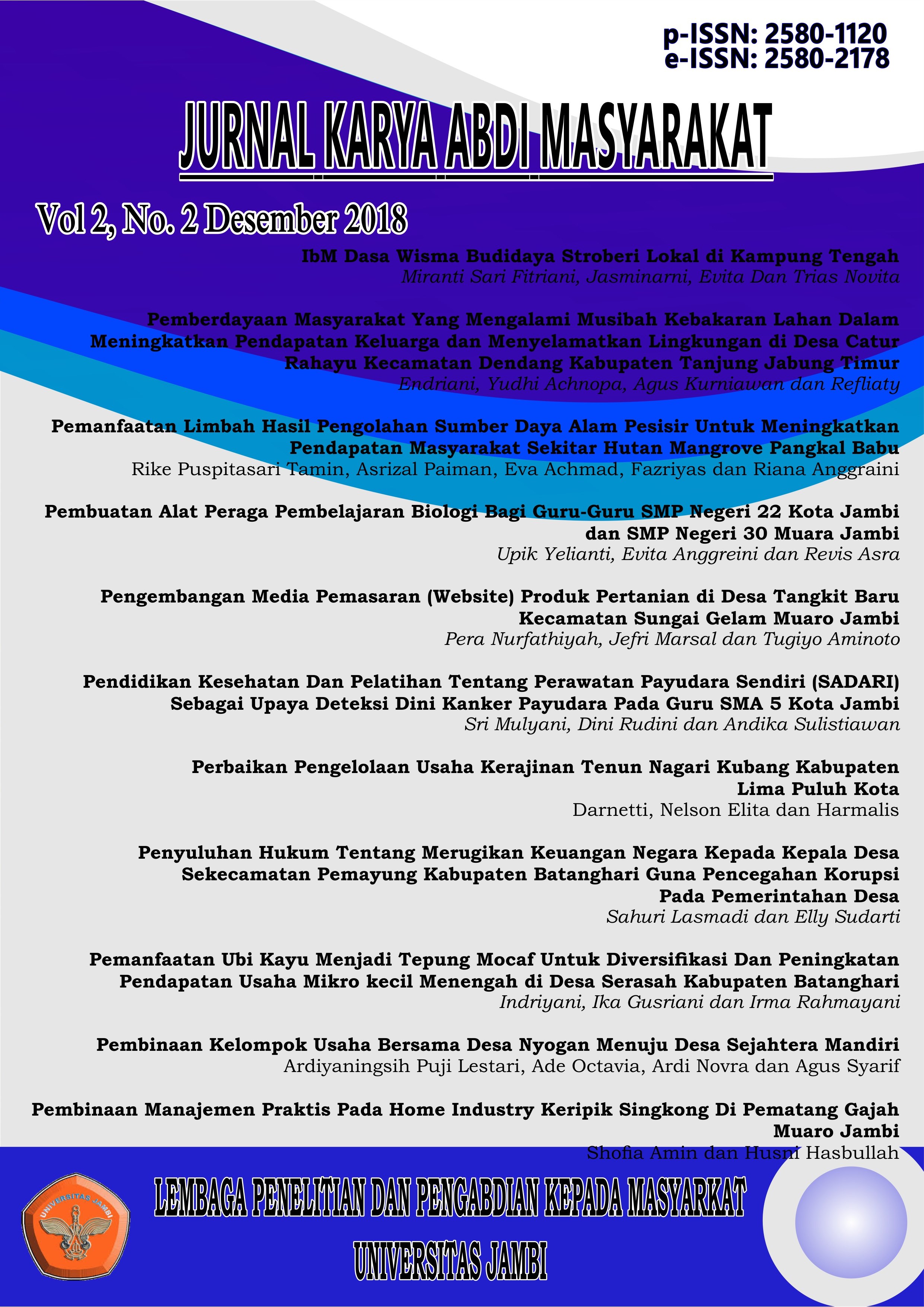IbM Dasa Wisma Budidaya Stroberi Lokal di Kampung Tengah
DOI:
https://doi.org/10.22437/jkam.v2i2.6083Keywords:
Kompos Limbah Teh, Stroberi Lokal OrganikAbstract
Kegiatan ini bertujuan meningkatkan pengetahuan dan ketrampilan kelompok dasa wisma lembayung dan kelompok dasa wisma sedap malam di Desa Kampung Tengah melalui pendampingan, penyuluhan dan demontrasi tentang tehnik pembuatan kompos limbah pabrik teh dan perbanyakan stroberi. Tanaman stroberi didaerah ini merupakan tanaman yang tumbuh liar tanpa memperhatikan aspek budidaya yang baik terutama dalam pemeliharaan dan pengendalian hama dan penyakit. Tanaman Stoberi mempunyai potensi ekonomi yang tinggi karena harga jual buah yang dihasilkan cukup mahal, bentuk dan rasa buahnya sangat disukai dan tergolong buah-buahan langka untuk daerah-daerah di sumatera. Buah stroberi ini dapat dikosumsi segar ataupun diolah untuk berbagai industri seperti pembuatan jelly, sirup atau juice dan penambah aroma bahan makanan lainnya. Bahan organik yang dapat dimanfaatkan, salah satunya adalah limbah pabrik teh, yang saat ini kurang dimanfaatkan. Limbah padat industri teh ternyata dapat dimanfaatkan untuk berbagai keperluan antara lain menjadi bahan baku pembuatan pupuk organik. Ampas teh yang akan dijadikan pupuk tanaman, diproses melalui pengolahan secara termofil. Caranya, ampas teh dari sisa penyeduhan di letakkan pada bak atau tempat khusus yang telah disediakan, kemudian dan didinginkan selama satu hari. Mikroorganisme ditambahkan untuk mempercepat proses penguraian dan dilanjutkan dengan proses pembalikan dalam seminggu sekali. Kompos siap digunakan setelah proses fermentasi berlangsung selama kurang lebih satu bulan. Secara umum target luaran yang akan dicapai akan memberi dampak terhadap Masyarakat umumnya dan kelompok dasa wisma lembayung serta dasa wisma sedap malam khususnya serta masyarakat disekitarnya. Dampak positif yang diharapkan tercapai melalui kegiatan ini dimana tim pengabdiaan akan melakukan pelatihan, demontrasi dan demplot untuk dasa wisma lembayung dan dasa wisma sedap malam dalam hal mengolahan limbah pabrik teh menjadi kompos yang akan dimanfaatkan sebagai media pada perbanyakan stroberi lokal. Dengan cara ini dapat menekan biaya produksi yang harus dikeluarkan , karena untuk pembelian pupuk sudah dapat ditekan dengan pemakaian kompos yang di hasilkan sendiri serta dapat menghindari pencemaran lingkungan dari pemakaian pupuk kimia. Target luaran yang dapat diharapkan dari kegiatan ini adalah meningkatnya pengetahuan kelompok dasa wisma akan pemanfaatan limbah pabrik teh dan pembudidayaan tanaman stroberi lokal sehingga akan di hasilkan kompos limbah teh dan stroberi lokal organik.
Downloads
References
Gunawan, Livy Winata 1996. Stroberi. Jakarta : Penebar Suadaya
Rukmana, R 1998. Stroberi Budidaya danPascapanen. Penerbit Kanisius
Sutanto, R. 2002. Penerapan Pertanian Organik. Yogyakarta: Kanisius
Sarwono, B. 2005. Cara budidaya yang tepat, efisien dan ekonomis - Jakarta : Penebar Swadaya
Downloads
Published
Versions
- 2018-12-31 (1)
- 2018-12-31 (1)
How to Cite
Issue
Section
License
Please find the rights and licenses in Jurnal Jurnal Karya Abdi Masyarakat (JKAM).
- License
The non-commercial use of the article will be governed by the Creative Commons Attribution license as currently displayed on Creative Commons Attribution 4.0 International License.
- Authors Warranties
The author warrants that the article is original, written by stated author(s), has not been published before, contains no unlawful statements, does not infringe the rights of others, is subject to copyright that is vested exclusively in the author and free of any third party rights, and that any necessary written permissions to quote from other sources have been obtained by the author(s).
- User Rights
JKAM's spirit is to disseminate articles published are as free as possible. Under the Creative Commons license, JKAM permits users to copy, distribute, display, and perform the work for non-commercial purposes only. Users will also need to attribute authors and JKAM on distributing works in the journal.
- Rights of Authors
Authors retain the following rights:
- Copyright, and other proprietary rights relating to the article, such as patent rights,
- The right to use the substance of the article in future own works, including lectures and books,
- The right to reproduce the article for own purposes, provided the copies are not offered for sale,
- The right to self-archive the article.
- Co-Authorship
If the article was jointly prepared by other authors, the signatory of this form warrants that he/she has been authorized by all co-authors to sign this agreement on their behalf, and agrees to inform his/her co-authors of the terms of this agreement.
- Termination
This agreement can be terminated by the author or JKAM upon two months notice where the other party has materially breached this agreement and failed to remedy such breach within a month of being given the terminating party notice requesting such breach to be remedied. No breach or violation of this agreement will cause this agreement or any license granted in it to terminate automatically or affect the definition of JKAM.
- Royalties
This agreement entitles the author to no royalties or other fees. To such extent as legally permissible, the author waives his or her right to collect royalties relative to the article in respect of any use of the article by JKAM or its sublicensee.
- Miscellaneous
JKAM will publish the article (or have it published) in the journal if the articles editorial process is successfully completed and JKAM or its sublicensee has become obligated to have the article published. JKAM may conform the article to a style of punctuation, spelling, capitalization, referencing and usage that it deems appropriate. The author acknowledges that the article may be published so that it will be publicly accessible and such access will be free of charge for the readers.








